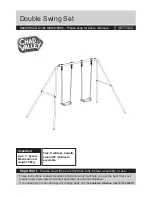
Placement and
Play Area Surfacing
Before installing the Lift & Lock Swing, select and
prepare a play area.
Placement
Install the swing at least one meter (three feet) from any
structure or obstruction such as a tree trunk, fence,
garage, house, overhanging branches, laundry lines or
electrical lines.
Surfacing
Following are guidelines from the U.S. Consumer
Product Safety Commission’s Handbook for Public
Playground Safety to minimize injuries that can result
from falls. These guildelines apply to playground
equipment including but not limited to swing sets and
climbing equipment.
Hard surfacing materials are not suitable for use
under this equipment. Earth surfaces such as soils
and hard packed dirt are also not recommended
because their shock absorbing properties can vary
depending on climatic conditions such as moisture and
temperature. Grass and turf are not recommended
because their effectiveness in absorbing shock during
a fall can be reduced considerably due to wear and
environmental conditions.
Acceptable surfacing materials are available in two
basic types: loose-fill and unitary.
Loose-fill materials can have acceptable shock
absorbing properties when installed at sufficient
uncompressed depth of at least 15 cm (6 inches).
These materials include sand (fine and coarse), gravel
(fine and medium) and shredded wood products (wood
mulch, shredded bark, wood chips). Loose-fills should
not be installed over hard surfaces such as asphalt
or concrete.
The depth of any loose-fill material could be reduced
during use resulting in different shock-absorbing
characteristics. For this reason, a depth greater than
the minimum recommended should be considered.
Unitary materials are generally rubber mats or a
combination of rubber-like materials held in place
by a binder that may be poured in place at the
playground site and cures to form a unitary shock
absorbing surface.
3


















